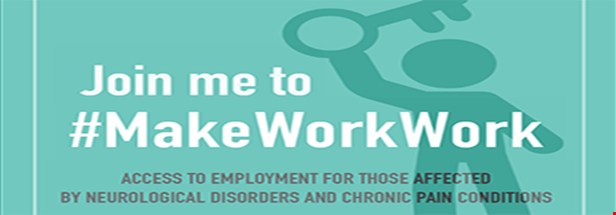Neurological Patients’ Struggle to Get Back to Work
 ©EFNA
©EFNA
A Written Declaration on “Access to Employment for those affected by Neurological Disorders and Chronic Pain Conditions” was launched in the European Parliament in late October. It will remain open for signature by MEPs until January 24th 2017.
“We are appealing for help to reach MEPs and to ask them to sign this important Written Declaration,” says Donna Walsh, Executive Director of the European Federation of Neurological Associations (EFNA), EPF member – who are coordinating this initiative with colleagues at Pain Alliance Europe (PAE).
“Access to equitable employment opportunities is something that goes beyond just neurological and chronic pain conditions and we hope that, if we are successful, this Written Declaration will serve as a platform for patient organisations in other disease areas to advance their advocacy work on this topic,” she continued.
You can help #MakeWorkWork by reaching out to MEPS using the templates and MEP contact details available on the dedicated website: http://www.brainmindpain.eu/written-declaration-access-to-employment/
Read Manuela’s story below to see just important this Written Declaration could be to those affected by neurological disorders…
“My stroke was one of those which happened during the night. I was already paralyzed when I tried, early next morning, to leave the bed,” remembers Manuela Messmer-Wullen.
Before she went to bed that night, Manuela was a successful business woman. She travelled internationally and was responsible for a department of 300 staff. When she woke up, having suffered a stroke in her sleep, she was facing a 6 week stay in intensive care, 3 months of hospital care, 5 months of rehabilitation hospital and 7 years of ongoing rehabilitation.
2 years into this long recovery, Manuela made a disastrous attempt to return to work.
“I could not remember what to do. I was not able to recognise the people speaking to me on the phone; my memory and concentration did not exist, my foreign languages had been completely lost,” she explains “I was in constant pain and always exhausted. I had no self-confidence, always questioning: where have my skills from before gone?”
“I decided there was no option but to leave the company and so informed my boss. What a horror for my ego! I felt deeply depressed, furious, anxious, ashamed, isolated and totally useless! If I had had the right sort of support to re-integrate effectively, the story would have been very different”
Unfortunately, many people affected by a neurological disorder are forced to leave work during the most productive years of life. This is a huge loss for them; but also for companies across Europe.
As many as 1 in 3 of us will be affected by a brain disorder during our lifetime (neurological or psychiatric). These are often chronic, long-term disorders – increasing in prevalence as the population ages.
Already, brain disorders cost the European economy over 800billion euros annually. Much of this cost can be attributed to the loss of employment and associated social welfare costs incurred to support these patients and their carers. By keeping these people at work longer, we can reduce the economic impact – but also improve the quality of life of those affected.
#MakeWorkWork
Contact:
Camille Bullot, Membership and Stakeholders Relationship Manager
